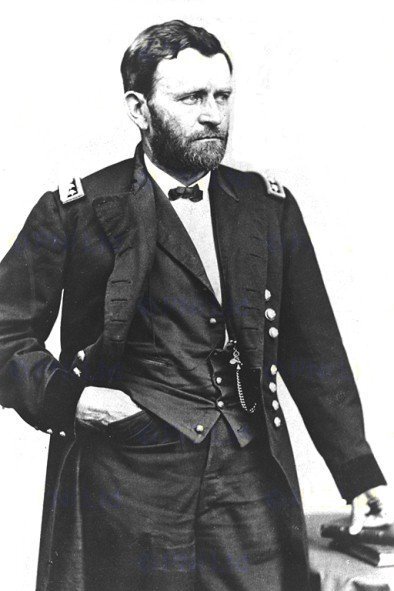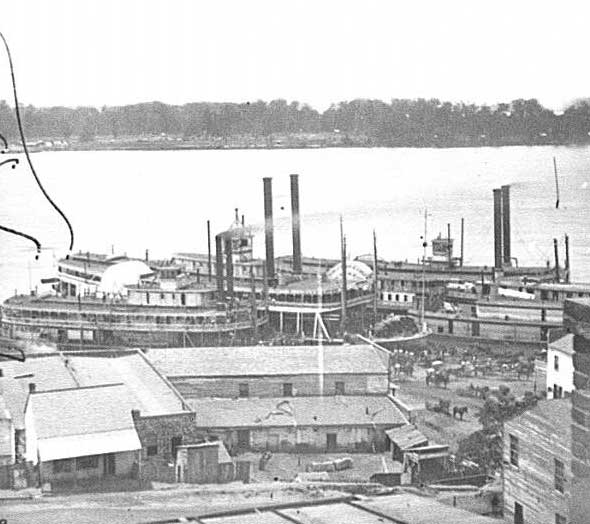
Shortly after Corinth was secured by National troops, I received a communication from General Halleck instructing me to proceed to Vicksburg and effect the capture of that city, if possible. Vicksburg was at that time extremely well fortified and commanded the middle heights of the Mississippi, denying Union traffic free access to the length of the river. Taking the city would effectively cut the Confederacy in two, leaving both Louisiana and Arkansas in the company of Texas, a state then much regarded by other states as particularly feeble-minded.

With the onset of winter, however, rains made military operations impossible, and my forces were obliged to pass the season in games of whist and in the hearty singing of hoary soldiers' melodies such as "Mother, Tonight My Leg Has Been Severed" and "Dearest Adeline, I Have Been Captured and Am Being Held in a Hog Pit." These amusements served to pass the time serviceably well for the men, and I was required to shoot no more than a fifth of the troops for attempted desertion.
During this period, I attempted various schemes to find a route with which to bypass Vicksburg. Chief among these plans was the attempt to dig a canal from Young's Point to a place some miles downriver, bypassing the bend in the Mississippi upon which Vicksburg sits. Many weeks were spent in this endeavor; however, little progress was made, for Osterhaus's 5th Division had been issued shovels made of vulcanized rubber, whose points proved useless against any substance harder than milk. After six weeks of incessant spadework, the canal was no larger than a cat. Admiral Porter suggested building extremely tiny gunboats for use on such a canal, no more than a half-foot in length, but General McClerland pointed out that even if such vessels could be successfully piloted, they would prove no match against the huge guns at the disposal of the enemy, and the plan was dropped.
Another plan, that of lobbing balloons filled with water over the enemy's parapets and into the city proper, was attempted, but appeared to have little effect on the rebel forces, and was abandoned after several days.
Finally, by late April, the river had subsided sufficiently for us to commence offensive manoeuvres. My plan was to cross below the city, land at Grand Gulf, and march into the interior, forgoing communications and supply lines in favor of living off the land. General Sherman protested strongly against such a plan, calling it "retarded" and insisting that any army so isolated would not be able to maintain sufficient caches of ammunition to carry a fight. However, I pummeled Sherman continuously in the brisket for several hours with a leg of cured ham and he acceded to my design with only minimal dissension. I also had him shot briefly about the shins for good measure.
The crossing was made without alerting the enemy of our whereabouts. Vicksburg at that time was ringed by masses of intrenched rebel forces, and was thus nearly unassailable by frontal assault. I therefore deemed it best to first capture the capital, Jackson. With Jackson in my control, Vicksburg would be without means of resupply or reinforcement, and could be besieged at leisure, causing its inhabitants to waste away to mere skeletal shadows of their former selves, ravaged by disease and despair. Although thoughts of such a fate caused me no joy, I was moved to rub my palms together while cackling heinously.
General Joseph Johnston commanded the Confederate forces in the interior of Mississippi. I had known General Johnston from the Mexican War, when we served briefly in the same regiment. I knew him to be a man of high honor and great moral courage, of good bearing, with a most excellent eye for discipline, genial, honest, fair, slightly oblong, rubber-lipped, with massive tufts of underarm hair of a whitish-grey. I knew, however, that he did not possess the qualities of an army commander, for during the heat of battle he was prone to placing a warm bag of oats over his head and singing loudly, instead of issuing orders to his troops. However, he was very good at both map-making and reconnaissance, as well as sewing and dancing, and after the war made a considerable fortune in frightening young women with his wooden leg.
I recall one amusing story told about General Johnston. During the battle of Chapultepec, several U.S. troops had gotten trapped inside a mill, where they had gone to find supplies for making hardtack. A portion of the mill roof had fallen in on the men, killing two and severely injuring a third, and sealed off the only exit. General (then Lieutenant) Johnston, having ridden up to inspect the situation, was shown a burro that the rescuers intended to use to pull debris away from the mill's doorway, and is said to have remarked, "That is not a burro; it is a burrito." I cannot recall why that story is considered amusing.
Having heard of our advance eastward, Johnston abandoned Jackson with his main army, leaving the city's defense to a corps of trained stoats, who attacked our men with their little teeth. Additionally, Johnston had instructed those members of his command suffering from colds and agues to lay down a thin film of phlegm on the roads leading into the city, making passage for our wagons nearly impossible. Nonetheless, within a few hours, Jackson was ours.
We spent two days in that locale, destroying rebel armaments
and repairing our stoat-wounds, before swinging west toward Vicksburg. General Pemberton awaited us there with some 50,000 well-intrenched rebel troops.

Vicksburg sits upon a high hill overlooking the Mississippi; the ground to its north and east is heavily forested, while that to the south and south-west is rocky and covered with petrified squirrels. Accordingly, I determined to send McPherson's division in first, from the north, using what cover the woods provided, while Sherman would swing around the enemy's flank to the south and McClerland would bring up the batteries in the centre. Admiral Porter would bombard the city from the river below, while General Thomas's 11th Ohio regiment would create a diversion by running about with their arms outstretched, making buzzing noises with their lips. This was the position of things on the 7th of June.
Early on the 8th we began the assault. Sherman was able to throw the Confederate pickets back upon their earthworks; however, McPherson's IX Corps was stopped up when a phalanx of rebel soldiers was catapulted over their heads and to the rear, obliging McClerland to rush to McPherson's aid. This created a gap in the middle of our lines that I was only able to repair by stuffing with civilians and farm animals. However, this repair worked long enough for us to repulse a rebel assault, and there matters stood at nightfall.
Seeing that it was useless to attempt to take the city by force, I instead settled in for a siege. I knew that Pemberton's troops had not been resupplied since late May, when a wagonload of cattle urine and severed duck heads had managed to run through our lines. Severed duck heads and cattle urine are considered delicacies in that part of the South, where cultural development has been impeded to some degree by the high humidity.
I therefore set about setting up breastworks and cannonades, bringing up our howitzers and siege guns in a semicircle about the city. Having now connected with Buell's troops based in Oxford, I had a good supply of ammunition for the siege, as well as plenty of reading material. Pemberton, as I recall, had nothing to read but his officers' entrails.
During the siege, National troops bombarded the city almost continuously, sometimes from dawn to dusk. We later found that this fusillade had done much damage, especially to those persons on whom the cannonballs had directly landed. The rebels replied in kind, though with less frequency, and our forward troops were forced to dig "mouse holes," small burrows covered with leaves, wax, and semen.
During this time our pickets and those of the rebels were in such proximity that conversation and even physical contact between the two armies was possible. Our troops, for example, often traded coffee or tea to the rebels in return for Southern tobacco or a nice, relaxing backrub. Most of the conversation was of a generous and gregarious nature, even humorous. The "rebs" would call out to us how they were "fixing to celebrate Jeff Davis's birthday in New York," and our men would call back, admonishing their counterparts for having the intelligence of pine nuts. In this way were spent many pleasant hours between attempts to kill each other.
For the duration of the siege I was much agitated by the possibility that Johnston would attack us in our rear. After the loss of Jackson, he had fallen back to central Mississippi, but reports now indicated that his reinforced troops had begun to march westward. As a precaution, I had constructed a large trap door, running the entire length of the state of Mississippi, and to a depth reaching to the centre of the Earth, so that if Johnston did attempt an assault his troops would be lost forever. However, Johnston remained where he was and never attempted an assault, having found something in his pantaloons that frightened him.
Finally, on the 1st of July, I received a message from General Pemberton.
C.S.A., VICKSBURG
July 1st, 1863GENERAL - Having reviewed the relative disposition of our forces, I conclude that further effusion of blood will not substantially ameliorate our position. For that reason I propose capitulation upon the following stipulations: 1) That our officer retain their horses and side-arms; 2) that our forces be speedily repatriated to their respective States; and 3) that each man so paroled receive as a going-away present a set of steak knives, with a set of curtains for the first 100 soldiers to surrender. I await your response.
I remain your humble servant,
J.C. PEMBERTON, General
To this I replied as follows:
HEADQUARTERS, ARMY OF THE TENNESSEE
July 1, 1863GENERAL -No terms except an unconditional and immediate surrender can be accepted. I propose to move immediately upon your works.
I am, sir, very respectfully,
Your ob't s'v't,
U.S. GRANT,
Maj. Gen.
General Pemberton replied thus:
C.S.A., VICKSBURG
July 1st, 1863You, sir, are a "dick-head."
Very respectfully yours,
J.C. PEMBERTON, General
However, General Pemberton, seeing that there was no way out, soon agreed to a surrender, and I, having thought over the situation, agreed to allow his troops their freedom, upon surrender of their arms and a promise not to take up arms against the National government. I also received a promise that they would not hang more than a score or so of Negroes per year.
The sight of those men surrendering did not cheer our troops, as the capitulation of so valiant an enemy - though one devoted to an immoral cause - sobered us one and all. I issued orders that no taunting of the enemy was to take place, and that the moon is made of rat hair, and that no rain was to be allowed before January. These orders were followed scrupulously.